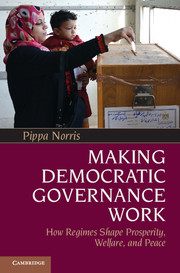Crossref Citations
This Book has been
cited by the following publications. This list is generated based on data provided by Crossref.
Corbett, Jack
2013.
Politicians and Professionalization in the Pacific Islands: Revisiting Self‐Regulation?.
Politics & Policy,
Vol. 41,
Issue. 6,
p.
852.
Stockemer, Daniel
and
Sundström, Aksel
2013.
Corruption and citizens’ satisfaction with democracy in Europe: what is the empirical linkage?.
Zeitschrift für Vergleichende Politikwissenschaft,
Vol. 7,
Issue. S1,
p.
137.
Jamil, Ishtiaq
Aminuzzaman, Salahuddin M.
and
Haque, Sk. Tawfique M.
2013.
Introduction: Governance in South, Southeast, and East Asia.
Public Organization Review,
Vol. 13,
Issue. 4,
p.
341.
Pushkar
2013.
Nation or State? Where Should We Look to Measure Democracy's Effects on Health?.
Forum for Development Studies,
Vol. 40,
Issue. 2,
p.
217.
Mattes, Robert
2013.
Systematic, Quantitative Political Science in South Africa: the Road Less Travelled.
Politikon,
Vol. 40,
Issue. 3,
p.
479.
Del Biondo, Karen
and
Orbie, Jan
2014.
The European Commission’s implementation of budget support and the Governance Incentive Tranche in Ethiopia: democracy promoter or developmental donor?.
Third World Quarterly,
Vol. 35,
Issue. 3,
p.
411.
Eloranta, Jari
Andreev, Svetlozar
and
Osinsky, Pavel
2014.
Research in Economic History.
Vol. 30,
Issue. ,
p.
1.
Menaldo, Victor A.
2014.
Crony Capitalism: A Transaction Cost Theory & Evidence.
SSRN Electronic Journal,
Dahlberg, Stefan
and
Holmberg, Sören
2014.
Democracy and Bureaucracy: How their Quality Matters for Popular Satisfaction.
West European Politics,
Vol. 37,
Issue. 3,
p.
515.
Bailard, Catie Snow
and
Livingston, Steven
2014.
Crowdsourcing Accountability in a Nigerian Election.
Journal of Information Technology & Politics,
Vol. 11,
Issue. 4,
p.
349.
Fortin-Rittberger, Jessica
2014.
Exploring the relationship between infrastructural and coercive state capacity.
Democratization,
Vol. 21,
Issue. 7,
p.
1244.
Khan, Mohammad Mohabbat
and
Islam, Md. Shahriar
2014.
Democracy and Good Governance in Bangladesh: Are They Compatible?.
Millennial Asia,
Vol. 5,
Issue. 1,
p.
23.
Stockemer, Daniel
and
Sundström, Aksel
2014.
(Dys-)Functionalities of Corruption.
p.
137.
Sumino, Takanori
2014.
Does Immigration Erode the Multicultural Welfare State? A Cross-National Multilevel Analysis in 19 OECD Member States.
Journal of Ethnic and Migration Studies,
Vol. 40,
Issue. 3,
p.
436.
Dahlberg, Stefan
Linde, Jonas
and
Holmberg, Sören
2015.
Democratic Discontent in Old and New Democracies: Assessing the Importance of Democratic Input and Governmental Output.
Political Studies,
Vol. 63,
Issue. 1_suppl,
p.
18.
Schmidt, Manfred G.
2015.
Complex Democracy.
p.
29.
von Soest, Christian
and
Wahman, Michael
2015.
Not all dictators are equal.
Journal of Peace Research,
Vol. 52,
Issue. 1,
p.
17.
Wang, Yi-ting
Mechkova, Valeriya
and
Andersson, Frida
2015.
Does Democracy or Good Governance Enhance Health? New Empirical Evidence 1900-2012.
SSRN Electronic Journal,
Stier, Sebastian
2015.
Democracy, autocracy and the news: the impact of regime type on media freedom.
Democratization,
Vol. 22,
Issue. 7,
p.
1273.
Durante, Massimo
2015.
The Democratic Governance of Information Societies. A Critique to the Theory of Stakeholders.
Philosophy & Technology,
Vol. 28,
Issue. 1,
p.
11.





